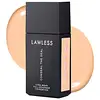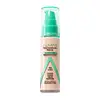Lawless Conseal The Deal Long-Wear Full-Coverage Foundation Versus Almay Clear Complexion Foundation
What's inside
What's inside
 Key Ingredients
Key Ingredients

 Benefits
Benefits

 Concerns
Concerns

 Ingredients Side-by-side
Ingredients Side-by-side

Water
Skin ConditioningIsododecane
EmollientC9-12 Alkane
SolventSilica
AbrasivePentylene Glycol
Skin ConditioningPolyglyceryl-6 Polyhydroxystearate
EmulsifyingPolyglyceryl-6 Polyricinoleate
EmulsifyingPropanediol
SolventMagnesium Sulfate
Zinc Stearate
Cosmetic Colorant1,2-Hexanediol
Skin ConditioningCetyl Alcohol
EmollientHydrogenated Lecithin
EmulsifyingCoco-Caprylate/Caprate
EmollientPolyglycerin-6
HumectantDisteardimonium Hectorite
StabilisingCaprylhydroxamic Acid
Bisabolol
MaskingTropaeolum Majus Flower/Leaf/Stem Extract
Skin ConditioningHelianthus Annuus Seed Oil
EmollientPropylene Carbonate
SolventLycium Barbarum Seed Oil
Skin ConditioningStearic Acid
CleansingCaprylyl Glycol
EmollientZingiber Officinale Root Extract
MaskingTocopherol
AntioxidantAscorbyl Palmitate
AntioxidantCI 77891
Cosmetic ColorantCI 77492
Cosmetic ColorantCI 77491
Cosmetic ColorantCI 77499
Cosmetic ColorantWater, Isododecane, C9-12 Alkane, Silica, Pentylene Glycol, Polyglyceryl-6 Polyhydroxystearate, Polyglyceryl-6 Polyricinoleate, Propanediol, Magnesium Sulfate, Zinc Stearate, 1,2-Hexanediol, Cetyl Alcohol, Hydrogenated Lecithin, Coco-Caprylate/Caprate, Polyglycerin-6, Disteardimonium Hectorite, Caprylhydroxamic Acid, Bisabolol, Tropaeolum Majus Flower/Leaf/Stem Extract, Helianthus Annuus Seed Oil, Propylene Carbonate, Lycium Barbarum Seed Oil, Stearic Acid, Caprylyl Glycol, Zingiber Officinale Root Extract, Tocopherol, Ascorbyl Palmitate, CI 77891, CI 77492, CI 77491, CI 77499
Water
Skin ConditioningCyclopentasiloxane
EmollientGlycerin
HumectantCyclohexasiloxane
EmollientNylon-12
Trimethylsiloxysilicate
EmollientPEG/PPG-18/18 Dimethicone
EmulsifyingDimethicone
EmollientCetyl PEG/PPG-10/1 Dimethicone
EmulsifyingBoron Nitride
AbsorbentIsodecyl Neopentanoate
EmollientCopernicia Cerifera Cera
EmollientSalicylic Acid
MaskingAloe Barbadensis Leaf Juice
Skin ConditioningMaris Sal
Skin ConditioningAlpha-Glucan Oligosaccharide
CleansingCaprylyl Glycol
EmollientDimethicone/Bis-Isobutyl PPG-20 Crosspolymer
EmollientHydrolyzed Vegetable Protein
Skin ConditioningLactobacillus
Skin ConditioningLecithin
EmollientMaltodextrin
AbsorbentPEG-10 Dimethicone
Skin ConditioningPerlite
AbsorbentPolymnia Sonchifolia Root Juice
Skin ConditioningTetrasodium EDTA
Tocopheryl Acetate
AntioxidantTriethoxycaprylylsilane
Trisiloxane
Skin ConditioningPhenoxyethanol
PreservativeIron Oxides
CI 77492
Cosmetic ColorantCI 77499
Cosmetic ColorantCI 77891
Cosmetic ColorantZinc Oxide
Cosmetic ColorantWater, Cyclopentasiloxane, Glycerin, Cyclohexasiloxane, Nylon-12, Trimethylsiloxysilicate, PEG/PPG-18/18 Dimethicone, Dimethicone, Cetyl PEG/PPG-10/1 Dimethicone, Boron Nitride, Isodecyl Neopentanoate, Copernicia Cerifera Cera, Salicylic Acid, Aloe Barbadensis Leaf Juice, Maris Sal, Alpha-Glucan Oligosaccharide, Caprylyl Glycol, Dimethicone/Bis-Isobutyl PPG-20 Crosspolymer, Hydrolyzed Vegetable Protein, Lactobacillus, Lecithin, Maltodextrin, PEG-10 Dimethicone, Perlite, Polymnia Sonchifolia Root Juice, Tetrasodium EDTA, Tocopheryl Acetate, Triethoxycaprylylsilane, Trisiloxane, Phenoxyethanol, Iron Oxides, CI 77492, CI 77499, CI 77891, Zinc Oxide
Ingredients Explained
These ingredients are found in both products.
Ingredients higher up in an ingredient list are typically present in a larger amount.
Caprylyl Glycol is a humectant and emollient, meaning it attracts and preserves moisture.
It is a common ingredient in many products, especially those designed to hydrate skin. The primary benefits are retaining moisture, skin softening, and promoting a healthy skin barrier.
Though Caprylyl Glycol is an alcohol derived from fatty acids, it is not the kind that can dry out skin.
This ingredient is also used as a preservative to extend the life of products. It has slight antimicrobial properties.
Learn more about Caprylyl GlycolCi 77492 is also hydrated iron III oxide. It's sole purpose is to give a yellow hue to products.
Iron III oxides are classified as inorganic chemicals for coloring.
Synthetically created Ci 77492 is considered safer than those naturally found. This is because the synthetically created version may contain less impurities. Iron oxides are generally non-toxic and non-allergenic.
Learn more about CI 77492Ci 77499 is also hydrated iron III oxide. It is created from mixing red and black iron oxides. This helps give shades of darkness to a product.
Iron III oxides are classified as inorganic chemicals for coloring.
Ci 77891 is a white pigment from Titanium dioxide. It is naturally found in minerals such as rutile and ilmenite.
It's main function is to add a white color to cosmetics. It can also be mixed with other colors to create different shades.
Ci 77891 is commonly found in sunscreens due to its ability to block UV rays.
Learn more about CI 77891Water. It's the most common cosmetic ingredient of all. You'll usually see it at the top of ingredient lists, meaning that it makes up the largest part of the product.
So why is it so popular? Water most often acts as a solvent - this means that it helps dissolve other ingredients into the formulation.
You'll also recognize water as that liquid we all need to stay alive. If you see this, drink a glass of water. Stay hydrated!
Learn more about Water